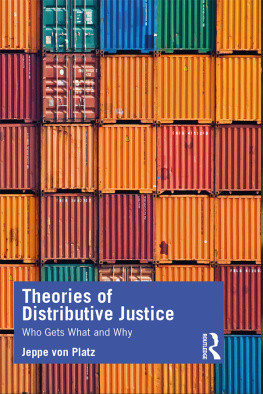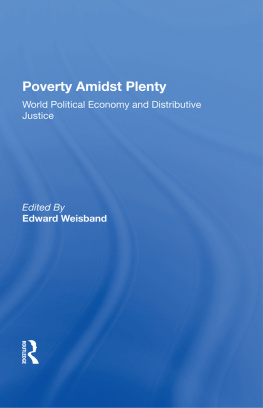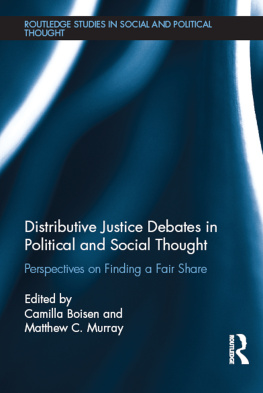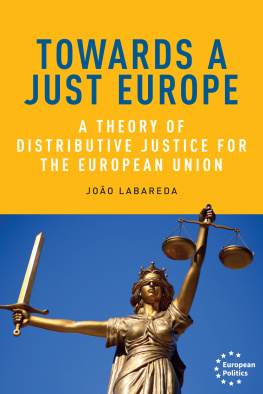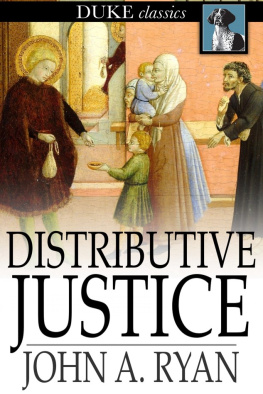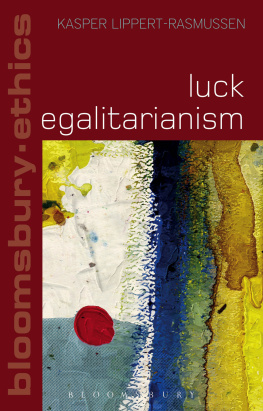This is an absolutely wonderful book! It easily offers the best overview of the political views of Hayek, Rawls, and Cohen available today. Moreover, when Jeppe von Platz offers criticisms of the views that he outlines they are always fair, and the outlines themselves are both accurate and charitable.
James Stacey Taylor, The College of New Jersey
With Theories of Distributive Justice, Jeppe von Platz does a real service for scholars and students alike. In admirably lively prose, employing clear and pertinent examples, Platz cogently lays out the most prominent positions on distributive justice, including Right Liberalism (represented by Hayek), Left Liberalism (Rawls), Libertarianism (Nozick), and Socialism (Cohen). More than a summary of arguments, this book assists readers in making up their own minds by providing a comparative critical analysis of each positions strengths and weaknesses, explaining eachs basic ideas and values, its conception of justice, and the institutions needed to implement the theory. Platzs concluding chapter presents contemporary challenges and alternatives to these theories, which will serve as a valuable provocation to both discussion in the classroom and further research in the field.
Gregory Fried, Boston College
Theories of Distributive Justice
How should we design our economic systems? Should we tax the rich at a higher rate than the poor? Should we have a minimum wage? Should the state provide healthcare for all? These and many related questions are the subject of distributive justice, and different theories of distributive justice provide different ways to think about and answer such questions. This book provides a thorough introduction to the main theories of distributive justice and reveals the underlying sources of our disagreements about economic policy. It argues that the universe of theories of distributive justice is surprisingly simple, yet complicated. It is simple in that the main theories of distributive justice are just four in number, and in that these theories each offer a distinct, well-defined theoretical approach to distributive justice; yet it is complicated in that the main theories disagree at several distinct, fundamental levels, and in that it is possible to spin innumerable new theories from the elements of the four main theories.
Key Features:
- Covers the four major theories of distributive justice and their leading philosophers, elucidating the attractions and drawbacks of each:
- Friedrich A. von Hayek and right-liberalism;
- John Rawls and left-liberalism;
- Robert Nozick and libertarianism;
- Gerald A. Cohen and socialism.
- Explains why these four theories have come to dominate most philosophical discussions on distributive justice, highlighting the essential answer provided in each that is lacking in other theories.
- Written for any reader interested in the topic, with an annotated reading list at the end of each chapter and helpful glossary at the back of the book.
Jeppe von Platz is Assistant Professor of Philosophy and in the PPEL Program at the University of Richmond.
First published 2020
by Routledge
52 Vanderbilt Avenue, New York, NY 10017
and by Routledge
2 Park Square, Milton Park, Abingdon, Oxon, OX14 4RN
Routledge is an imprint of the Taylor & Francis Group, an informa business
2020 Taylor & Francis
The right of Jeppe von Platz to be identified as author of this work has been asserted by him in accordance with sections 77 and 78 of the Copyright, Designs and Patents Act 1988.
All rights reserved. No part of this book may be reprinted or reproduced or utilised in any form or by any electronic, mechanical, or other means, now known or hereafter invented, including photocopying and recording, or in any information storage or retrieval system, without permission in writing from the publishers.
Trademark notice: Product or corporate names may be trademarks or registered trademarks, and are used only for identification and explanation without intent to infringe.
Library of Congress Cataloging-in-Publication Data
A catalog record for this title has been requested
ISBN: 978-0-367-33236-5 (hbk)
ISBN: 978-0-367-33235-8 (pbk)
ISBN: 978-0-429-31878-8 (ebk)
For Marie
I have been interested in distributive justice for as long as I can remember, and I have tried to make sense of my thoughts about it for almost as long. On the way I started studying theories of distributive justice. This book presents some of the results of these studies. My hope is that reading it will provide you with a much better understanding of what you should think about when considering questions of distributive justice.
A theory of distributive justice is an attempt to make sense of what we should care about, and how we should care about it, when we design the economic systems whereby the benefits and burdens of society are distributed among its members. My studies have taught me that the universe of theories of distributive justice is both simple and complicated. It is surprisingly simple in that the main theories of distributive justice are just four in number, and in that these theories each occupy a well-defined space in the universe of theories of distributive justice. It is complicated in that the main theories disagree at several distinct levels of theory, and in that it is possible to create innumerable mongrel theories out of the elements of the four main theories.
My main debts are to my parents, to my teachers David A. Reidy, Samuel Freeman, Kok-Chor Tan, and Paul Guyer who taught me how to think about distributive justice; and to my students, who taught me that I didnt think well enough. Lauren McGillicuddy and Sarah Millward helped edit every part of the manuscript and I am deeply grateful to both for innumerable corrections and suggestions for improvements.
What this Book Is About
If youve ever had dealings with children, you know that they want things especially things that other people have. Almost as soon as theyve learned to say mom or dad, they start saying (well, shouting) mine! when another kid (or adult) holds something that looks vaguely like a toy. Try giving a piece of pie to one child without giving any to the three year old next to her, and youll immediately hear cries of Not fair! Though they sometimes express themselves better, adults often share the same sentiments. While distributive justice is not in our genes, it is pervasively, permanently, and unavoidably part of the human experience. We are social and political animals living in a world of finite resources, and we face questions about the distribution of goods and burdens from the moment we start manipulating the world until we die. Whether you like it or not, you care about distributive justice, and distributive justice cares about you.
What is a fair distribution of a resource? The answer depends on the resource and the context of the question. For many goods and contexts, the answer seems obvious enough. Normally we should divide the pie equally among the children whod like to have a piece of it. Or take medicine in a time of need: if some infection is ravaging the population, we should give antibiotics to those who are sick. Or think about seats in a restaurant: those who get there first, get to pick first, and those who show up late have to take whatever seats are left, if any. Or grades in school: those who merit higher grades should get them. Of course, sometimes the answer to how we should distribute some good is that we shouldnt try to distribute it at all. Think of dance partners at the club: the right distribution is whatever results from the free choices of the persons at the club.

